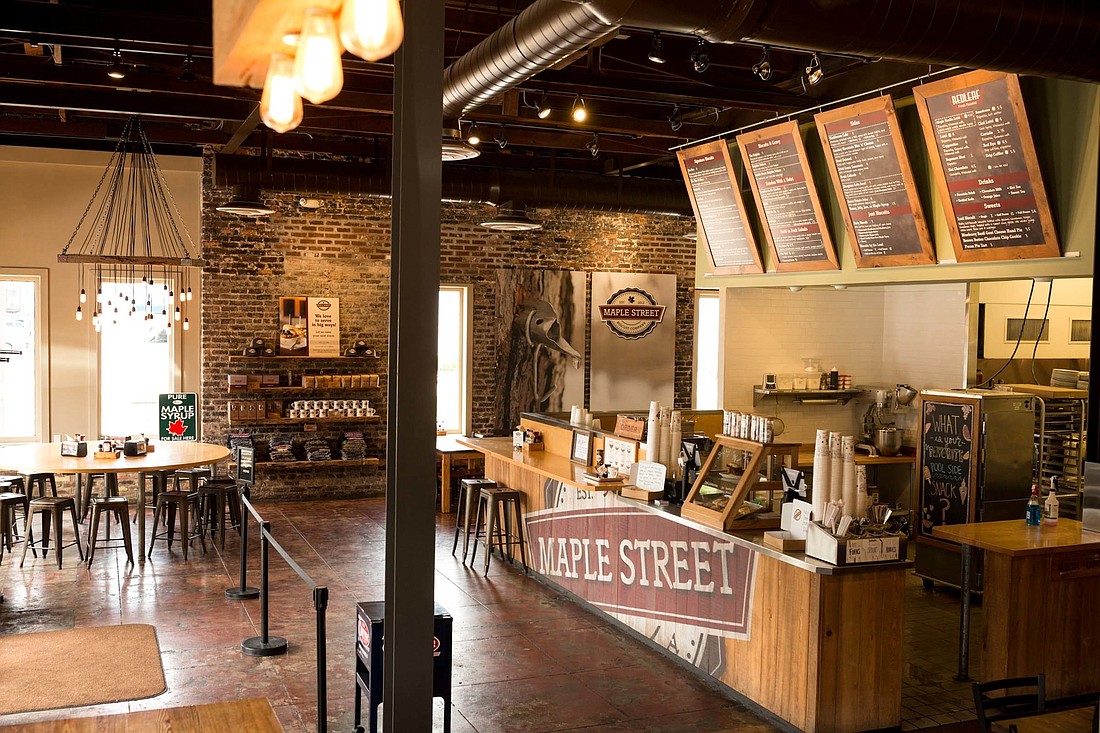
By Marc Milot, Maple Street Biscuit Company
By Nelson BradShaw, BBVA Compass Northeast Florida
Maple Street Biscuit Company was launched in November of 2012 with a mission of helping people, serving others and being a part of the community.
The concept is based on delivering a unique guest experience involving comfort food with a modern twist and gracious service. This mission and its principles are the key to the brand’s success.
As of today, there are 25 locations across the Southeast. All are company-owned except for one which is a charter store (Maple Street’s version of a franchise).
Maple Street takes a disciplined approach to site selection that begins with identifying communities that can be served in a meaningful way, where the store itself becomes a destination and ultimately an integral part of a community’s identity.
This requires finding sites that contain the attributes essential to delivering the Maple Street experience. Unique buildings that can be brought back to life while revitalizing the surrounding community are the best opportunities.
Discipline in maximizing revenue per square foot is always a priority with most stores ranging in size from 2,400 to 3,300 square feet. Stand-alone buildings or a multitenant plaza endcap with outside seating are most preferred. In-line sites are less common due to limited outside seating.
Part of the modern twist concept involves a modern industrial/rustic aesthetic incorporated into the design of stores. This requires high ceilings with open double-spiral ductwork, brick and wooden accents and fixtures lit with Edison bulbs, open dining areas with large community tables and immaculately clean and polished concrete floors.
Just as important as the site is the deal surrounding it.
Taking the necessary time to negotiate the right deal is essential to growth as a sustainable business and forming a long-term partnership with the landlord.
Among the biggest factors affecting site selection are occupancy costs, with rent and build-out costs carrying the most weight in all negotiations. This makes second-generation restaurant sites the most attractive.
Once a deal is inked, the goal is to optimize free-rent periods by minimizing build-out time and opening for business as soon as possible after receiving a Certificate of Occupancy.
Concerning the financing of these stores, when a restaurant chain or franchisee is planning on adding several locations in a year, it is very time-consuming and unpredictable to go through an approval process to have each location approved for financing.
As a result, a few banks have a specialty lending department set up specifically to meet the needs of growing, multiunit restaurateurs.
Meredith Guess, local BBVA Compass commercial relationship manager, consulted with the bank’s food franchise lending experts to set up what is referred to as a “development line” to assist Maple Street with its projected growth.
In establishing a development line, the bank looks at the number of new stores a company wants to open for the year and the average cost to develop each store.
If the average cost to build-out a store is $1 million and the company wants to build 10 stores, the bank would approve a $10 million development line. This allows the company to not worry about the financing of each store, giving them the flexibility to be in negotiations at various stages with property owners on multiple locations at one time.
Once a development budget is established for a specific location, the bank sets up a sub-commitment for that amount under the master commitment. Monthly draws are funded for the construction, and the sub-commitment termed out after the location opens.
Development lines generally are reserved for companies that already have 10-plus locations. With a number of locations already opened and producing cash flow, the bank is not as dependent on the next store being financed to have to carry its own financing weight.
A company like Maple Street already has proved it is successful at site selection, so the bank is not concerned with approving the site, just the company’s overall strategy.
Despite the challenges associated with current real estate market realities, applying a disciplined approach to site selection and deal negotiation with the right financing structure is enabling Maple Street to continue to grow rapidly and bring the experience to more and more communities.
Milot is the vice president of site development for Maple Street Biscuit Company.
Bradshaw is CEO for BBVA Compass in Northeast Florida and is president-elect of the NAIOP Commercial Real Estate Development Association Northeast Florida Chapter.